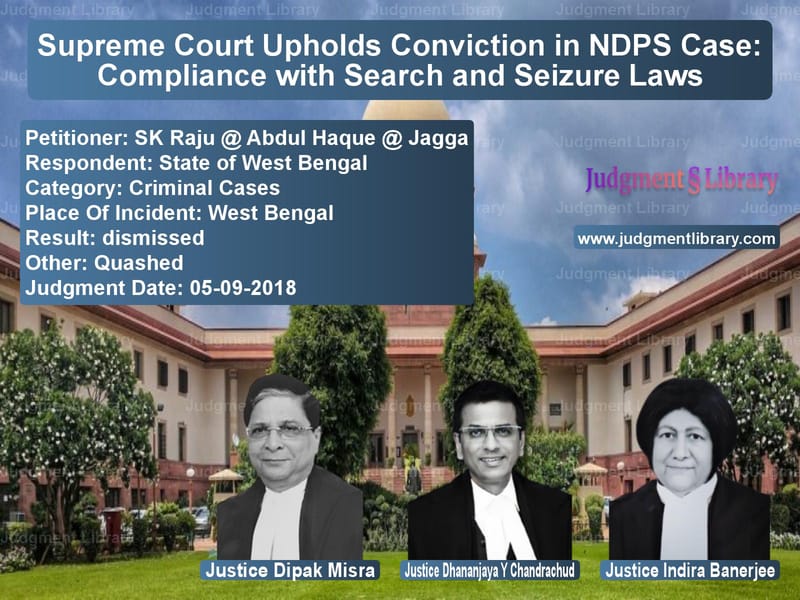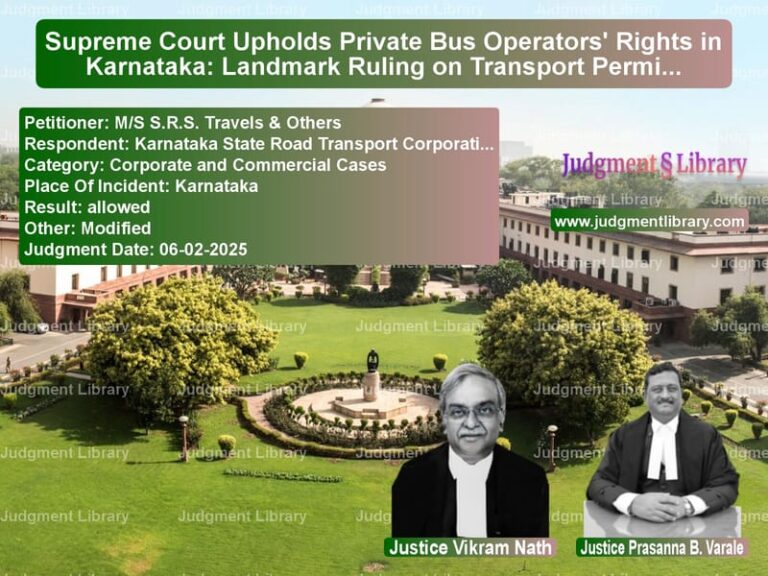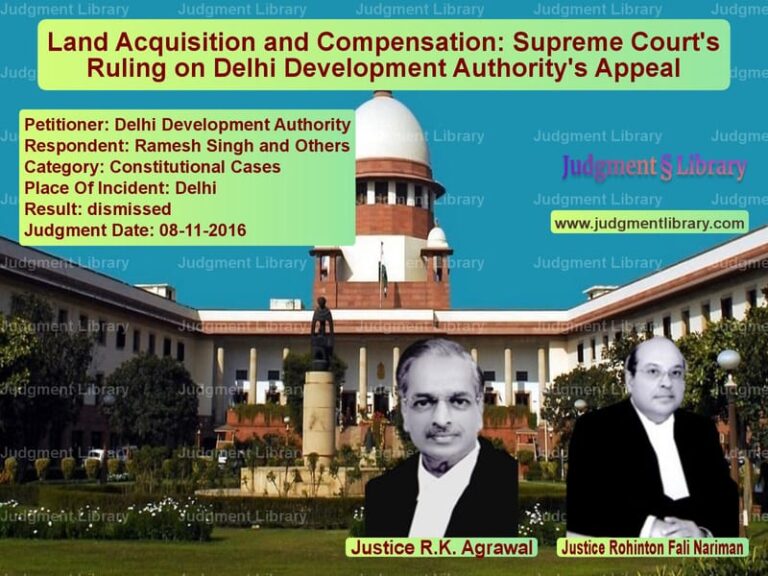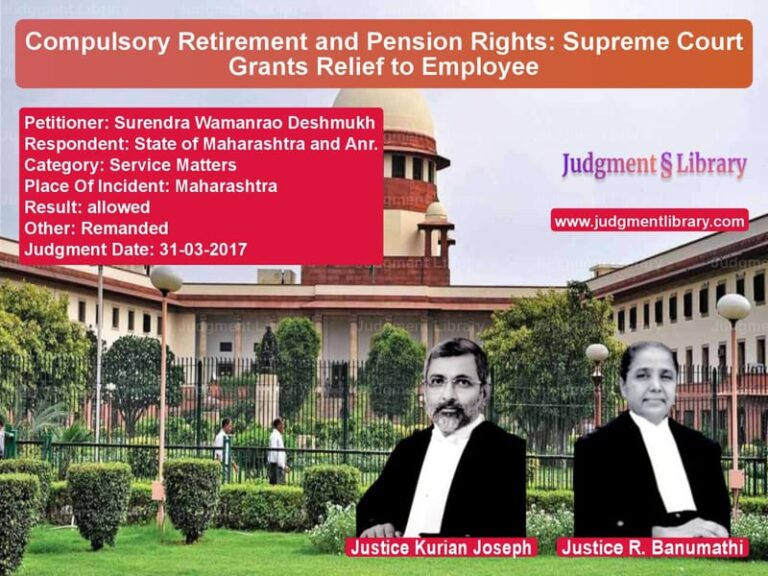Supreme Court Upholds Conviction in NDPS Case: Compliance with Search and Seizure Laws
The case of SK Raju @ Abdul Haque @ Jagga vs. State of West Bengal is a landmark judgment in which the Supreme Court of India examined the compliance of procedural safeguards under the Narcotic Drugs and Psychotropic Substances Act, 1985 (NDPS Act). The judgment, delivered on September 5, 2018, upheld the conviction of the appellant, reinforcing the importance of adherence to search and seizure laws in drug-related offenses.
The Supreme Court dismissed the appeal and ruled that procedural safeguards were adequately followed during the investigation. The case involved the seizure of 1.5 kilograms of charas from the appellant in a public place. The defense contended that the mandatory provisions of the NDPS Act, specifically Sections 42 and 50, were not followed. However, the Court held that since the seizure took place in a public place, compliance with Section 42 was unnecessary. Additionally, it found that the requirements of Section 50 were properly adhered to.
Background of the Case
The case arose from an incident on November 15, 2011, when Sub-Inspector Prasanta Kr. Das (PW-2) of the Narcotics Cell, Detective Department, Kolkata, received information that the appellant, a drug dealer, would be supplying narcotic drugs near Tiljala Falguni Club, Kolkata. Acting on this tip, the police organized a raid and apprehended the appellant at around 1:40 PM.
During the search, the appellant was found in possession of a jute bag containing 19 deep brown rectangular sheets, which, upon testing, were identified as charas. The police also recovered Rs. 2,400 in cash from the appellant’s trouser pocket. The appellant was charged under Section 20(b)(ii)(C) of the NDPS Act, which deals with offenses related to commercial quantities of narcotic substances.
Arguments by the Appellant
The appellant’s counsel raised the following key arguments:
- There was non-compliance with Section 42 of the NDPS Act, which mandates that officers must record the information in writing before conducting a search.
- The search was illegal as the investigating officer did not follow due process.
- The provisions of Section 50 were violated because the appellant was not informed of his legal right to be searched in the presence of a magistrate or a gazetted officer.
- The evidence was not properly collected and examined, leading to a lack of credibility in the prosecution’s case.
Arguments by the Respondent (State of West Bengal)
The prosecution countered these claims by arguing that:
- The search took place in a public area, and therefore, Section 42 was not applicable as per the law.
- The appellant was duly informed of his rights under Section 50, and he voluntarily chose to be searched in the presence of a gazetted officer.
- The prosecution followed proper procedures, and the seizure of the narcotic substance was lawful.
- The conviction should be upheld as the trial court and High Court had correctly appreciated the evidence.
Supreme Court’s Analysis and Judgment
The Supreme Court examined two major contentions of the appellant: compliance with Section 42 and Section 50 of the NDPS Act.
Observations on Section 42
Section 42 deals with search and seizure in private places, requiring officers to record information before acting. The Court ruled that:
“The place of occurrence was accessible to the public and fell within the ambit of the phrase ‘public place’ under Section 43 of the NDPS Act. Section 42 had no application.”
The Court referred to past judgments and held that searches conducted in public places do not require the procedural compliance mandated by Section 42.
Observations on Section 50
Section 50 of the NDPS Act provides that when a person is searched, he must be informed of his right to have the search conducted before a magistrate or a gazetted officer. The appellant argued that he was not properly informed of this right.
However, the Court found that:
- The appellant was twice informed of his right to be searched in the presence of a magistrate or a gazetted officer.
- He voluntarily opted to be searched in the presence of a gazetted officer.
- The compliance with Section 50 was strictly followed as required by law.
Based on these findings, the Court ruled:
“The search of the appellant was conducted in the presence of a gazetted officer, in consonance with the voluntary communication made by the appellant. There was strict compliance with the requirements of Section 50.”
Final Ruling
The Supreme Court dismissed the appeal and upheld the conviction and sentence imposed by the lower courts:
- The appellant was sentenced to 14 years of rigorous imprisonment.
- A fine of Rs. 1,40,000 was imposed.
Impact of the Judgment
This judgment has significant implications for narcotic-related offenses in India:
- It reaffirms that public place searches do not require compliance with Section 42.
- It clarifies that procedural compliance under Section 50 must be strictly followed.
- It sets a precedent for future cases where drug seizures occur in public places.
- The ruling strengthens law enforcement’s ability to conduct efficient and lawful drug-related investigations.
Conclusion
The Supreme Court’s ruling in this case is a significant precedent in the enforcement of the NDPS Act. It ensures that procedural safeguards are followed while preventing individuals accused of serious drug offenses from escaping conviction due to technicalities. The judgment reinforces the balance between protecting legal rights and ensuring the law’s effective implementation in combating narcotic-related crimes.
Petitioner Name: SK Raju @ Abdul Haque @ Jagga.Respondent Name: State of West Bengal.Judgment By: Justice Dipak Misra, Justice Dhananjaya Y Chandrachud, Justice Indira Banerjee.Place Of Incident: West Bengal.Judgment Date: 05-09-2018.
Don’t miss out on the full details! Download the complete judgment in PDF format below and gain valuable insights instantly!
Download Judgment: SK Raju @ Abdul Haqu vs State of West Bengal Supreme Court of India Judgment Dated 05-09-2018.pdf
Direct Downlaod Judgment: Direct downlaod this Judgment
See all petitions in Drug Possession Cases
See all petitions in Judgment by Dipak Misra
See all petitions in Judgment by Dhananjaya Y Chandrachud
See all petitions in Judgment by Indira Banerjee
See all petitions in dismissed
See all petitions in Quashed
See all petitions in supreme court of India judgments September 2018
See all petitions in 2018 judgments
See all posts in Criminal Cases Category
See all allowed petitions in Criminal Cases Category
See all Dismissed petitions in Criminal Cases Category
See all partially allowed petitions in Criminal Cases Category







